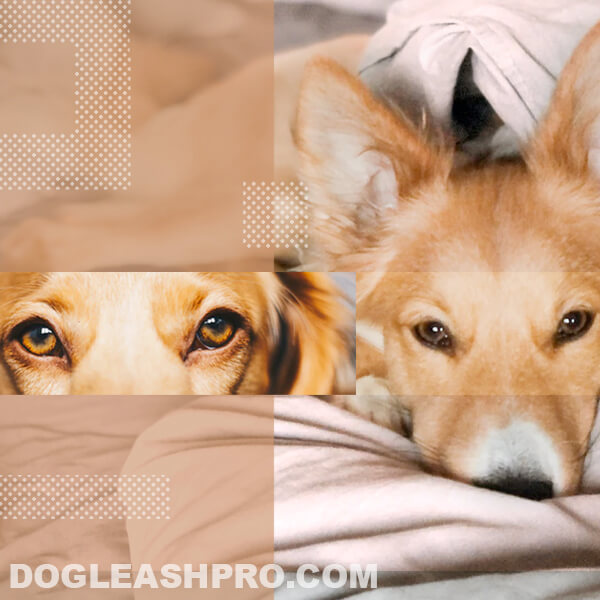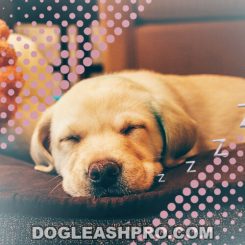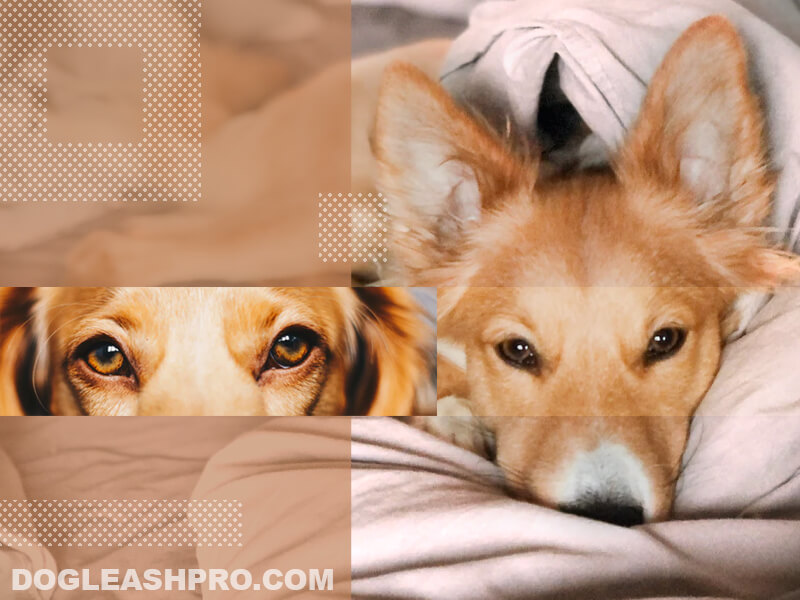
When I brought home my Labrador puppy, I expected her to sleep a lot like my Chihuahua puppy. A few weeks in, I saw my Lab lying down with her eyes half open and thought she was just watching me because I could see rapid eye movement. However, she didn’t move an inch when I called her and it seems like she was actually having a dream and breathing fast while sleeping.
Since I’ve never seen my Labrador dog sleeps with eyes open before, I was a bit startled, concerned, and confused all at the same time. Is my Labrador ok? Should I be worried?
Dog Sleeps With Eyes Open! It is actually pretty common for dogs to sleep with either one or both eyes half-open. Most of the time, this is typically harmless. However, there are times when dogs sleeping with their eyes open can be a cause for concern.
If you’ve recently encountered your dog sleeping with eyes open and are worried, we totally understand as we’ve been there ourselves as well. Fortunately, I’ve spoken with my dog’s veterinarian and also research the heck out of this topic so you’ll be much more prepared and informed than I was.
Here it is!
Table of Contents
Do dogs sleep with their eyes open?
Yes, sometimes dogs do sleep with their eyes partially open and it is completely common. However, for many new dog owners witnessing this for the first time can be an unsettling one.
Why do dogs sleep with their eyes open?
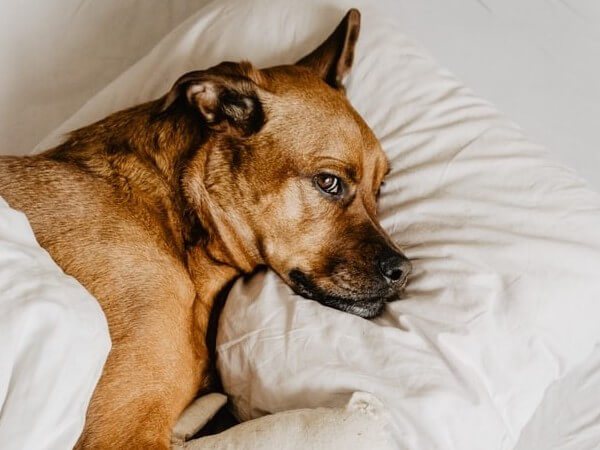
If you have a male dog that sleeps with his eyes open, you may be wondering, “why does my dog sleep with his eyes open?” and whether that is normal.
While our dogs are domesticated today, they came from a generation of dogs that used to live out in the wild and had to adapt and use survival strategies in order to survive. One of which is to sleep with their eyes open.
Dogs sleeping with their eyes open could be that they are still alert to what is going on around them. Their eyes partially open while they sleep could be an indication that part of their brain is still awake and remain alert to any dangers in their surroundings while the other part of their brain rests.
Sometimes with their eyes half-open, it can deceive predators into thinking that the dogs are still wide awake and observant of what is going on. This helps to prevent predators from attacking them.
Related article: How To Soften Dog Eye Boogers?
Can dogs sleep with their eyes open?
As you can see, dogs can definitely sleep with their eyes open and it’s pretty common. Here is why dogs can sleep with their eyes open without causing any irritation to their eyes such as itchiness or dryness.
If you notice your dog sleeping with his eyes open a tiny bit, you won’t probably see his eyeballs right away. That’s because our canine friends have what’s called a nictitating membrane or a third eyelid. Most people will not be able to see the dog’s third eyelid from a distance since only a small portion of their third eyelid is visible and sits right behind the outer eyelid.
The third eyelids or nictitating membrane helps with the following:
- Keeps the dog’s cornea clean and moist with every blink of the third eyelid.
- Protect your pup’s eyeball from harm and injury.
- Produce tears to keep the eyes constantly clean.
- Produce antibodies and act as a lymph node to defend against infections.
You may be interested in Dog Lymphoma: When to Euthanize
Whenever the third eyelids blink or close, it acts like a broom and will sweep away tiny debris or dust from the eyeballs.
When your four-legged friends open their eyes again, the third eyelids automatically opens as well and go back into the innermost corner of the eyes. As you can see, the third eyelid acts accordingly. If your pooch is closing its eyes to sleep, the nictitating membrane closes as well. When your K9 friends open their eyes, the nictitating membrane opens too.
Most of the time when your dog sleeps with their eyes slightly open, dog owners will usually see their third eyelid instead of the surface of their eyeballs since the nictitating membrane is in its closed position.
Why do some dogs sleep with their eyes open?
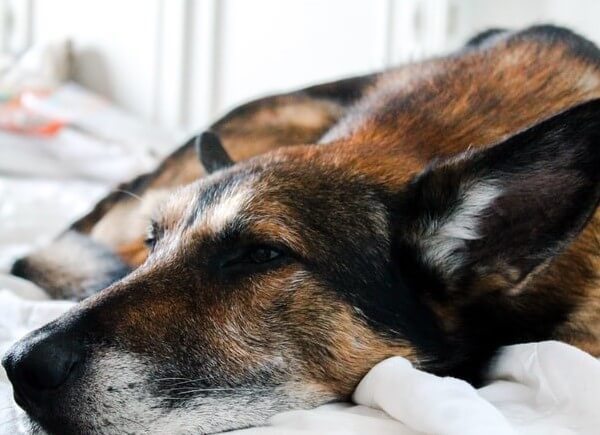
In order to understand why some dogs sleep with their eyes open, let’s take a look at a typical dog’s sleeping pattern and see whether dogs sleeping with eyes open is a cause for concern.
If you have dogs, you’ll know that it is normal for them to sleep for about 12 to 14 hours a day. In fact, puppies need more sleep than that with up to 18 to 20 hours a day. After a fun day of play, learning, training, exploring, and spending hours with their dog owners and trainers, they must be really exhausted. Sleep is a way to recoup, feel refresh, and have their needed energy.
You may also be interested in Leash Training: How to Train Your Dog to Walk on a Leash
Similar to young puppies, many older or senior dogs also need to sleep more because they get tired quickly and more easily. If you have large dog breeds like a German Shepherd, Border Collie, or Bernese Mountain dog, they will require more sleep than smaller dog breeds like a Chihuahua, Beagle, or Bichon Frise.
Some dogs that were bred to be hunting or working breeds such as Border Collies and German Shepherds may sleep with their eyes open. That is because they were bred to handle certain tasks like watching for predators or herding sheep so they to stay alert most of the time.
Typical sleeping patterns for dogs
When your four-legged friends hit the bed, they enter deep sleep and start out in a slow-wave or short-wave sleep for about 10 minutes. You’ll notice their heart rate and breathing usually slow down and their blood pressure also drops.
Typically after 10 minutes, your dog may enter into the rapid eye movement (REM) stage and start dreaming. During this stage, your dog’s eyelids typically remain close because they are dreaming.
My dog sleeps with his eyes open! Why?
Now that your dog is in deep sleep and his eyelids should be closed, why is it that your dog appears to sleep with his eyes open? Should it be a concern where you have to contact your vet right away?
Take a deep breath because the majority of the time, dogs sleeping with their eyes open is not really something to worry about. Although you’re freaked out by it because it doesn’t look normal to you, it doesn’t mean there’s something wrong with your precious pooch.
If your dogs are sleeping peacefully with their eyes slightly or partially open, then there is no need to wake them up and interrupt their sleep.
Because dogs naturally stay alert in order to protect their owners or pack from intruders or burglars, it’s pretty easy for them to wake up and it’s actually common for canines to wake up before finishing the full sleep-wake cycle.
When this happens, your dog may have slightly opened his eye and you caught him at a specific point in time when his eyes are partially open before he dozes off and drifts back to sleep.
Don’t miss: My Dog Snores And Sounds Congested (10 Reasons & How To Help)
Dog Sleeps With Eyes Open: When does it become a problem?
In rare cases, a dog who looks like he is asleep is actually having a major seizure. A seizure can be hereditary and it usually affects the dog’s brain. If your dogs are sick, they may have seizures as well.
It’s important to note that when dogs have a seizure, it’s different from the regular twitching of the body or legs that usually occurs when a dog is dreaming. Let’s find out the difference.
If your precious canine companion is having a seizure, his eye will usually be wide open and you may notice odd eye movements or a blank stare. Dogs that are simply just twitching from having a dream will typically have each of their eyelids partially closed and looking relaxed.
Dogs experiencing seizures with their eyes fully open is usually a rare occurrence. Most of the time, dogs experiencing seizures will have other health issues that their owners are aware of so that the seizures and eyes wide open shouldn’t shock them. If you suspect your canine friends are having a seizure, contact your vet immediately and bring your pooch in for a checkup.
Handy Hint: Health problems that can cause seizures in dogs can include kidney failure, liver disease, toxins, brain trauma, or brain tumors.
I’ve also spoken with my dog’s vet and she pointed out that some brachycephalic dogs that were bred for flat faces may lose the ability to close their eyelids completely. Brachycephalic dogs such as French Bulldog have flat faces and their eyes protrude out so much from their socket that their eyelids are not able to close comfortably.
Some cases could be if your dogs have narcolepsy, then their eyes may stay open while they are sleeping and it creates abnormal sleep.
Another case would be if your dogs have epilepsy. Dogs with epilepsy may appear like they are sleeping when they really are not sleeping at all.
In both of these cases, your pooch may not be sleeping well with their eyes slightly open and you’ll want to consult with your vet right away.
Dog Sleeps With Eyes Open: When to leave your dogs alone and when to contact the vet
In most cases, dogs that sleep with eyes open are pretty normal and not really a cause for concern. If you notice your dog sleeps with eyes open, be sure to raise your observation with your vet at your next visit.
If you notice the following, be sure your vet is informed of this as well:
- Your furry pals sleep with their eyes open on a regular basis and their eyes seem red, watery, sore, inflamed, itchy, or dry.
- During exercise, going out for a walk, or other unexpected moments, your pooch just suddenly falls asleep.
- If their eyes are open and you softly call out to them from a couple of feet away and they are not able to wake up.
It’s important to note that dog owners should never try to wake up their dogs sleeping with their eyes open by startling or touching them. This can startle the pooch and cause some disorientation when they wake up and may even cause them to become aggressive.
DISCLAIMER: THIS WEBSITE DOES NOT PROVIDE MEDICAL ADVICE
The information, including but not limited to, text, graphics, images and other material contained on this website are for informational purposes only. No material on this site is intended to be a substitute for professional veterinary advice, diagnosis, or treatment. Always seek the advice of your veterinarian or other qualified health care provider with any questions you may have regarding a medical condition.
Resources:
https://en.wikipedia.org/wiki/Nictitating_membrane
https://www.pnas.org/content/116/29/14677

With over five years of specialized experience as an animal writer, my expertise lies in dog nutrition, health, behavior, grooming, and training. I am dedicated to delivering helpful and informative content that caters to the well-being of our furry friends. My primary goal is to empower pet owners with knowledge and ensure our canine companions thrive in health and happiness. In my free time, I love volunteering at local dog rescue centers.
